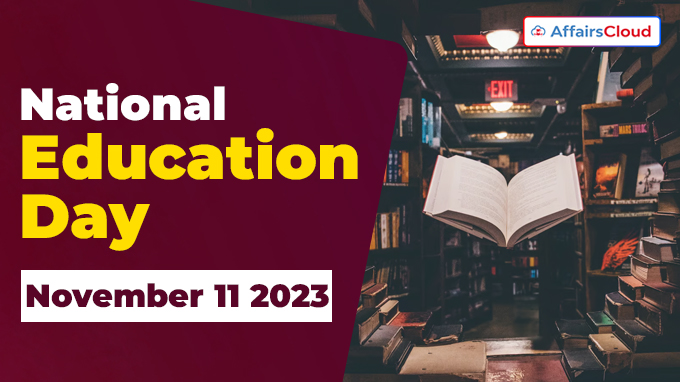 National Education Day is annually observed across India on 11 November to mark the birth anniversary of ‘Bharat Ratna’ Maulana Abul Kalam Azad, the first education minister of independent India.
National Education Day is annually observed across India on 11 November to mark the birth anniversary of ‘Bharat Ratna’ Maulana Abul Kalam Azad, the first education minister of independent India.
- His immense contribution to the field of education in India is recognised by celebrating his birthday as National Education Day across India.
This day serves to raise awareness about the fundamental right to education and underscore its supreme importance.
- 11 November 2023 marks the 135th birth anniversary of Maulana Abul Kalam Azad, who was born on 11 November 1888, in Mecca (Saudi Arabia).
Background:
i.In 2008, the Ministry of Human Resource Development (now the Ministry of Education (MoE)) declared 11 November, the birth anniversary of Maulana Abul Kalam Azad as National Education Day.
ii.The first-ever National Education Day was observed on 11 November 2008.
About Maulana Abul Kalam Azad:
i.Maulana Abul Kalam Azad was born with the name Abul Kalam Ghulam Muhiyuddin in 1888 in Mecca and settled in Calcutta (now Kolkatta, West Bengal) in 1890.
ii.He started publishing a weekly journal in Urudu called “Al-Hilal” in 1912, which was subsequently banned by the British authorities.
iii.He became the president of the Indian National Congress on two occasions, in 1923 and 1940.
iv.He was a prominent leader in the Indian independence movement and played a dynamic role in the Khilafat Movement (1920-24) and also served as the president of the All-India Khilafat Committee.
v.In, October 1920, he was elected as a member of the foundation committee to establish Jamia Millia Islamia at Aligarh (Uttar Pradesh).
- In 1934, he assisted in shifting the campus of the University from Aligarh to New Delhi, Delhi. He laid down the foundation of higher education in India.
vi.After the Khilafat Movement, he was inspired by Mahatma Gandhi and actively participated in his civil disobedience initiatives namely the Dandi March (1930) and the Quit India Movement (1942).
vii.He served as the Minister of Education (the first education minister in independent India) in Pandit Jawaharlal Nehru’s cabinet from 1947 to 1958.
viii.He died on February 22, 1958. He was posthumously awarded the Bharat Ratna in 1992 in recognition of his efforts as a freedom fighter, journalist, scholar, and poet.
His Contributions:
i.He played a pivotal role in the establishment of several renowned educational institutes viz:
- the first-ever, Indian Institute of Technology (IIT) in 1951;
- the University Grant Commission (UGC) in 1953,;
- The Central Institute of Education, Delhi (Now, Department of Education of Delhi University).
ii.He established the majority of the important cultural and literary institutions that exist today, including the Lalit Kala Academy, the Sahitya Academy, the Sangeet Natak Academy, and the School of Planning and Architecture, etc.
iii.He was monumental in establishing the Indian Council for Cultural Relations (ICCR) to secure cultural exchange between India and the Eastern Countries.




